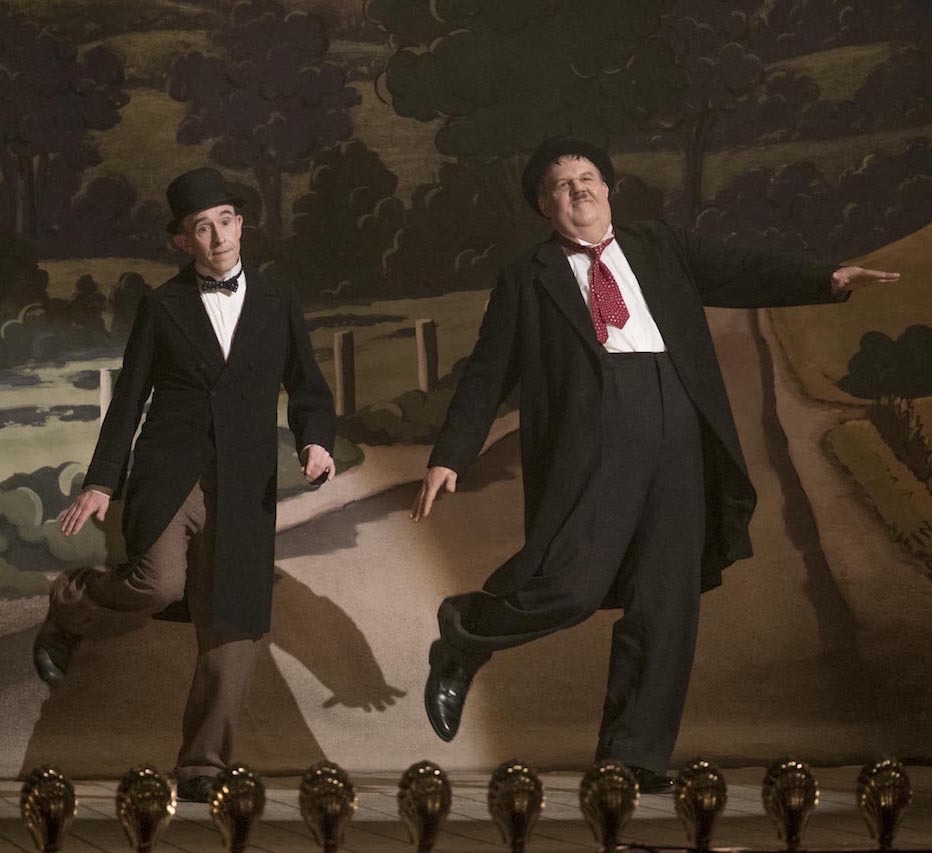Review:
"Stan & Ollie"

Release Date: Jan. 25, 2019
Rating: PG Running Time: 97 minutes Few biopics emanate a pure and unconditional love for its subjects than Stan & Ollie. Director Jon S. Baird and screenwriter Jeff Pope’s unabashed affection for Stan Laurel and Oliver Hardy is felt in every scene of their account of the legendarily comedy duo’s 1953 U.K. music tour, and it is contagious. It is impossible not to sit through this sweet and sentimental study in friendship and not root for Laurel and Hardy to both win back the audience they lost over time but to repair a partially broken professional partnership. Baird and Pope treat Laurel and Hardy with such adulation that fans should eagerly embrace Stan & Ollie for its respectful depiction of the film comedy icons and non-fans will immediately want to seek out Laughing Gravy, The Music Box, and Way Out West. Also, Steve Coogan and John C. Reilly capture the onscreen essence of Laurel and Hardy, respectively, to perfection. Their recreations of Laurel and Hardy’s best-known comedy routines and song-and-dance numbers, transferred from the big screen to the stage for their tour, are a joyful sight to behold. Offstage, Coogan and Reilly engage with each other with obvious warmth and admiration befitting of Laurel and Hardy's strong but complicated relationship, but the wistful regret they share over a past professional difference hangs heavy over their heads. As they begin their U.K. tour, playing to near-empty houses, Laurel and Hardy are forced to confront the time they had to go their separate ways professionally. Laurel felt betrayed by Hardy when the latter refused to leave the Hal Roach Studios and made a solo vehicle, 1939’s Zenobia, which Laurel dismissively refers to as “The Elephant Film.” Hardy argues that, unlike Laurel, he was still signed to Hal Roach Studios and appeared in Zenobia under contractual obligation. “You can’t have Hardy without Laurel,” the latter unequivocally states. (Laurel stood by his words and did not appear again onscreen following Hardy’s 1957 death.) The gentle bickering between Laurel and Hardy comes to a head when Hardy says to Laurel, “You loved Laurel and Hardy but you never loved me.” This dagger to the heart—felt as much by the audience and it is by Hardy—is said with a quiet, contemplative animosity that is reflective of the approach taken by Stan & Ollie director Jon S. Baird and screenwriter Jeff Pope. Stan & Ollie is not fueled by anger and conflict but by a regrettable betrayal that is not forgiven or forgotten. To some extent, Hardy comes across as the bad guy in that Stan & Ollie portrays him as failing to support Laurel in his bid to earn them more money from their films. But Baird and Pope do not pass judgment Hardy for fulfilling his contractual obligation. Their goal is to celebrate an enduring and influential professional and personal partnership that resulted in many films that not only have stood the test of time but are funnier than many of the comedies released today. True, you cannot have Hardy without Laurel. But Stan & Ollie reaffirms that you also cannot have Laurel without Hardy. Robert Sims Aired: Jan. 24, 2019 Web site: https://www.sonyclassics.com/stanandollie/ |
|
